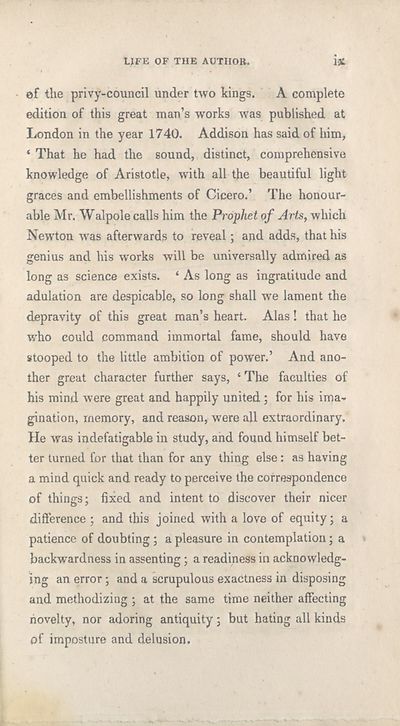Download files
Complete book:
Individual page:
Thumbnail gallery: Grid view | List view

of the privy-council under two kings. A complete
edition of this great man’s works was published at
London in the year 1740. Addison has said of him,
‘ That he had the sound, distinct, comprehensive
knowledge of Aristotle, with all the beautiful light
graces and embellishments of Cicero.’ The honour¬
able Mr. Walpole calls him the Prophet of Arts, which
Newton was afterwards to reveal; and adds, that his
genius and his works will be universally admired as
long as science exists. ‘ As long as ingratitude and
adulation are despicable, so long shall we lament the
depravity of this great man’s heart. Alas! that he
who could command immortal fame, should have
stooped to the little ambition of power.’ And ano¬
ther great character further says, ‘The faculties of
his mind were great and happily united; for his ima¬
gination, memory, and reason, were all extraordinary.
He was indefatigable in study, and found himself bet¬
ter turned for that than for any thing else: as having
a mind quick and ready to perceive the correspondence
of things; fixed and intent to discover their nicer
difference ; and this joined with a love of equity; a
patience of doubting; a pleasure in contemplation; a
backwardness in assenting; a readiness in acknowledg¬
ing an error; and a scrupulous exactness in disposing
and methodizing ; at the same time neither affecting
novelty, nor adoring antiquity; but hating all kinds
of imposture and delusion.
edition of this great man’s works was published at
London in the year 1740. Addison has said of him,
‘ That he had the sound, distinct, comprehensive
knowledge of Aristotle, with all the beautiful light
graces and embellishments of Cicero.’ The honour¬
able Mr. Walpole calls him the Prophet of Arts, which
Newton was afterwards to reveal; and adds, that his
genius and his works will be universally admired as
long as science exists. ‘ As long as ingratitude and
adulation are despicable, so long shall we lament the
depravity of this great man’s heart. Alas! that he
who could command immortal fame, should have
stooped to the little ambition of power.’ And ano¬
ther great character further says, ‘The faculties of
his mind were great and happily united; for his ima¬
gination, memory, and reason, were all extraordinary.
He was indefatigable in study, and found himself bet¬
ter turned for that than for any thing else: as having
a mind quick and ready to perceive the correspondence
of things; fixed and intent to discover their nicer
difference ; and this joined with a love of equity; a
patience of doubting; a pleasure in contemplation; a
backwardness in assenting; a readiness in acknowledg¬
ing an error; and a scrupulous exactness in disposing
and methodizing ; at the same time neither affecting
novelty, nor adoring antiquity; but hating all kinds
of imposture and delusion.
Set display mode to:
![]() Universal Viewer |
Universal Viewer | ![]() Mirador |
Large image | Transcription
Mirador |
Large image | Transcription
| Antiquarian books of Scotland > Languages & literature > Bacon's essays, and Goldsmith's essays > (15) |
|---|
| Permanent URL | https://digital.nls.uk/123482241 |
|---|
| Description | Thousands of printed books from the Antiquarian Books of Scotland collection which dates from 1641 to the 1980s. The collection consists of 14,800 books which were published in Scotland or have a Scottish connection, e.g. through the author, printer or owner. Subjects covered include sport, education, diseases, adventure, occupations, Jacobites, politics and religion. Among the 29 languages represented are English, Gaelic, Italian, French, Russian and Swedish. |
|---|

